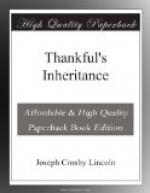Thankful had, during the repairs on the house, waited more or less anxiously for developments concerning the mystery of the little back bedroom. Painters and paperhangers had worked in that room as in others, but no reports of strange sounds, or groans, or voices, had come from there. During the week preceding the day of formal opening Thankful herself had spent her nights in that room, but had not heard nor seen anything unusual. She was now pretty thoroughly convinced that the storm had been responsible for the groans and that the rest had been due to her imagination. However, she determined to let that room and the larger one adjoining last of all; she would take no chances with the lodgers, she couldn’t afford it.
Among the equipment of the High Cliff House or its outbuildings were a horse, a pig, and a dozen hens and two roosters. Captain Obed bought the horse at Mrs. Barnes’ request, a docile animal of a sedate age. A second-hand buggy and a second-hand “open wagon” he also bought. The pig and hens Thankful bought herself in Trumet. She positively would not consent to the pig’s occupying the sty beneath the woodshed and adjoining the potato cellar, so a new pen was built in the hollow at the rear of the house. Imogene was tremendously interested in the live-stock. She begged the privilege of naming each animal and fowl. Mrs. Barnes had been encouraging the girl to read literature more substantial than the “Fireside Companion” tales in which she had hitherto delighted, and had, as a beginning, lent her a volume of United States history, one of several discarded schoolbooks which Emily Howes sent at her cousin’s request. Imogene was immensely interested in the history. She had just finished the Revolution and the effect of her reading was evident when she announced the names she had selected.
The horse, being the most important of all the livestock, she christened George Washington. The pig was named Patrick Henry. The largest hen was Martha Washington. “As to them two roosters,” she explained, “I did think I’d name the big handsome one John Hancock and the littlest one George Three. They didn’t like each other, ma’am, that was plain at the start, so I thought they’d ought to be on different sides. But the very first fight they had George pretty near licked the stuffin’ out of John, so I’ve decided to change the names around. That ought to fix it; don’t you think so, ma’am?”
On the seventeenth the High Cliff House was formally opened. It was much too early to expect “summer” boarders, but there were three of the permanent variety who had already engaged rooms. Of these the first was Caleb Hammond, an elderly widower, and retired cranberry grower, whose wife had died fifteen years before and who had been “boarding around” in Wellmouth Centre and Trumet ever since. Caleb was fairly well-to-do and although he had the reputation of being somewhat “close” in many matters and “sot” in his ways, he was a respected member of society. He selected a room on the second floor—not a front room, but one on the side looking toward the Colfax estate. The room on the other side, across the hall, was taken by Miss Rebecca Timpson, who had taught the “upstairs” classes in the Wellmouth school ever since she was nineteen, a considerable period of time.




